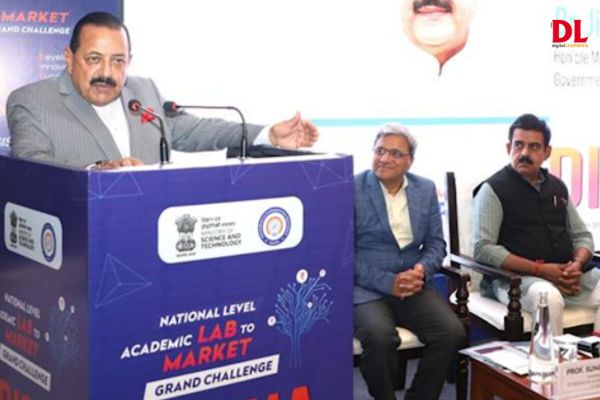
Spending on Research and Development (R&D) in India has become more than doubled in the last decade, says Dr. Jitendra Singh. Dr. Singh, the Union Minister of State (Independent Charge) for Science and Technology; Earth Sciences and Minister of State for PMO, Department of Atomic Energy, Department of Space, Personnel, Public Grievances and Pensions, was speaking at an event by Designing Innovative Solutions for Holistic Access to Justice (DISHA) on Monday in New Delhi.
At the DISHA event at India Habitat Centre, Dr. Singh said, “India R&D spending (GERD) is double in last one decade during the government headed by Prime Minister Narendra Modi, from Rs 60,196 cr in 2013-14 to ₹1,27,381 cr and is shaping the future economy of India which will be defined by home-grown innovations in artificial intelligence, biotechnology, and quantum computing.”
Underscoring the role of government-backed initiatives in catalysing scientific advancements, Dr. Jitendra Singh highlighted the government’s multi-pronged strategy to position India as a global leader in deep-tech innovation and commercialisation. The Union Minister for Science and Technology (Independent charge) reiterated that India is making significant strides in fostering an intellectual property (IP)-driven innovation ecosystem, with academia, industry, and startups playing a pivotal role.
The DISHA Program, an initiative aimed at Developing Innovations, Successful Harnessing, and Adoption, is a step towards building a knowledge-based economy where research-driven solutions transform industries. The program is designed to support faculty members and students working on disruptive technologies across disciplines, ensuring that India remains at the forefront of global innovation.
Dr. Jitendra Singh emphasized that initiatives like DISHA align with the Anusandhan National Research Foundation (ANRF), which seeks to create a unified research ecosystem bridging science, humanities, and social sciences. This integrated approach will empower Indian researchers to engage in cross-sectoral collaborations, pushing the boundaries of discovery and implementation.
The space sector, in particular, has witnessed a surge in innovation, with startups actively contributing to satellite development, launch services, and space-based applications. The government’s decision to open up the nuclear energy sector to private players is another transformative step aimed at leveraging indigenous expertise to drive energy security and sustainability.
Also Read: 40% of global population lacks education in native language: UNESCO Report
One of the key highlights of Dr. Jitendra Singh’s address was India’s policy shift in allowing private sector participation in strategic fields such as space technology and nuclear research. “What was once solely the domain of government institutions is now open to private enterprises, enabling faster technological advancements, higher efficiency, and global competitiveness,” he stated.




















